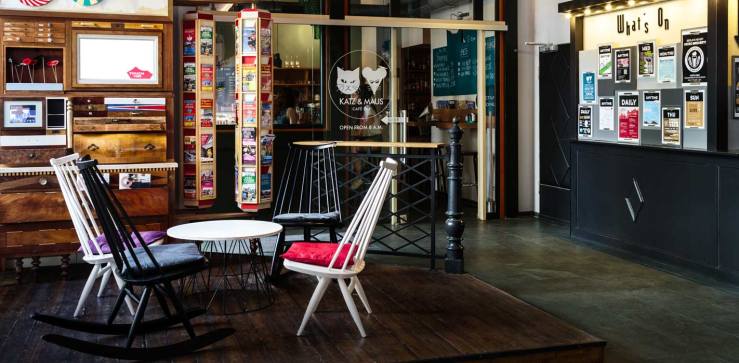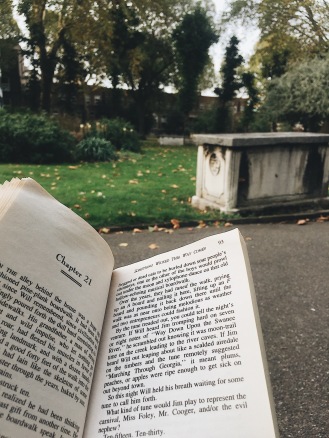
Remember when you were in school and the teacher left the classroom for a moment causing you and your peers to erupt into a desperate kind of chaos? You knew that Mrs. No-Passing-Notes-During-Silent-Reading-Time would be back any minute and you did everything in your power to revel in your newfound freedom before the squeak of the classroom door sounded the return of elementary authority.
Somehow, hostels (at least the ones I have been staying in) manage to permanently extend that sense of fleeting euphoria by giving it a place to call home. The presence of bunk-beds, cheap breakfast, and far too much alcohol have created an atmosphere where young travellers can occupy a state of childlike abandon.
Sounds great, right?
In some aspects, yes, hostels are wonderful. I don’t think anyone could argue against indulging in unadulterated bliss. And while some adapt very naturally to this kind of atmosphere, others—uptight and controlling people like me—need more time to adjust.
It becomes rather hard to stay introverted while you’re sharing a space with a bunch of strangers. There is literally no place for you to be alone—even if you try to remain secluded, you are always going to be around people. And as much as you’d rather be curled up somewhere in a blanket burrito with Netflix asking, “Are you still there?” sometimes you don’t have a choice but to interact with your hostel-mates.
That said, eventually, talking to strangers gets easier and, even if only for the briefest of seconds, you start to wonder what you may have missed acting like a hermit for all those years.
Here are some good things I’ve noticed about not being anti-social:
- It can be rather cathartic talking to someone you don’t know and will likely never see again. It’s akin to speaking to a therapist except you’re both drunk, neither one of you is qualified to be giving life advice, nor do you intend to book a follow-up appointment.
- Conversing with strangers—especially in the hostel setting—is the ultimate form of voyeurism. It’s kind of fascinating how much you can learn about someone when you aren’t distracted by the mundane familiarity of your everyday life. A simple ten-minute conversation can build such an intricate vignette of a person’s life that you feel like you’ve known them for longer than it takes to drink a pint.
- And, ultimately, nothing bad has happened from interacting with strangers, so I don’t really have an excuse to not do it.
Despite the fact that meeting new people while travelling has been, overall, a positive experience, I found there were still moments of loneliness staying in hostels as a solo traveller. For the first two weeks of this trip, I was lucky enough to travel with one of my best friends, so I didn’t ever have the chance to feel alone. After he went home, however, it took me a while to adjust to his absence and the silence that accompanied it.
The funny thing is, when I was back at home, I often chose to spend time alone. It wasn’t unusual to find myself alone among people I didn’t know. And as I talk about in my previous post, time alone is how I recharge, even if that time happens in a public space.

What was surprising about experiencing time alone in London, was the fact that it didn’t end. It was a different kind of alone than I’d experienced before and I was a little bit unsure of how to exist in this brand of personal space. Being alone in Canada came in short sprints; this, however, was a marathon.
Unlike in Canada, my time alone in the UK wasn’t always a choice, but rather my only option and a continuous one at that. It was pure, uninterrupted solitude. And to be completely honest, my head had a hard time making sense of the transition of going from constant familiar company to none at all.
Of course, you’re always meeting new people in a hostel, but I found that sometimes the process of meeting fellow travellers only wasn’t always the sunshine and roses painted in the list above. There were times when interacting with strangers only served to remind me that I was alone.
By the fourth or fifth time experiencing what I’d like to call The Hostel Exchange—questions like: who are you?; where are you from?; how long have you been travelling for?; where have you visited?—it weighs on you that you’re having to answer these questions over and over again because no one knows who you are. And, what’s more, you start to wonder if the person asking these questions is only doing so because they too are alone.
Don’t get me wrong, I’ve met some truly incredible people while living the hostel life—the extremely talented German photographer, the champion Canadian beer pong players, the Brazilin parade crasher, and the American #momswithacause. We would’ve never crossed paths were it not for staying in the same place. I know it sounds like there’s a “but” coming, but there’s not. (See what I did there?) I am incredibly lucky to have met the people I have on this trip.
I think where the loneliness comes from is that I’m comparing an assortment of meaningful, yet fleeting connections with strangers to the prolonged, familiar connections I have with those I left at home. One certainly is not superior to the other. One is simply novel to me and that novelty can, at times, be a little jarring.
Going into this, I knew this trip was going to have a steep learning curve, but so far the things I’ve been learning about aren’t what I expected them to be. I anticipated learning about history and culture and how to navigate a city where you don’t speak the language. And while I have gained some knowledge of those topics, I’ve also learned so much about myself in the process. But, I’ve rambled enough for one post so y’all are just going to have to wait it out while I procrastinate writing about that. You’ll likely hear from me again sometime in the next 5-10 years. So, as Tigger says, “Ta-ta for now!”

[…] pretzels and beer, delightful German food and long stories about our families back at home, and stories with strangers to process the upsidedowness of the […]
LikeLike
[…] I said in an earlier post, I’ve been fortunate enough to meet some absolutely wonderful people on this trip, and Scotland […]
LikeLike